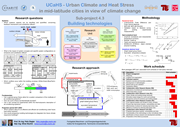Research Module 4.3 Building technologies
General
Active air-conditioning (A/C)-systems typically are employed whenever the heat-stress risk needs to be decreased, as these impact on the hazard, namely on the indoor climate. These A/C-systems and their performance are dependent both on indoor and outdoor conditions in a complex way. Moreover, the use of these technical means implies demand of energy (heat or/and work) and water, feeding back in a negative way on the outdoor climate, both locally and globally.
The necessity to provide sustainable low-energy A/C calls for a restrictive use of conventional systems. The alternative option of using passive cooling and ventilation techniques in modern buildings generates the risk of an indoor-climate that is not suitable for highly vulnerable persons. Active A/C-systems driven by low-
temperature heat are a promising third way as sustainable resources (e.g. solar or waste heat) can be employed.
Research questions
- Which methodologies allow for a system comparison of the multitude of A/C-systems?
- Which A/C-systems are suitable for air-conditioning with respect to minimized heat-stress risks?
- What are predominant substitution effects between heat, work, water, and heat-stress risks in A/C- systems?
- How can the influence of the outdoor conditions on the energetic efficiency and feedback mechanisms of the technologies onto the climate be quantified?
Collaboration within Research Links (RL)
| 420a | Urban climate and building energy demands | 430 | Simulation-based design for rooms and buildings for reducing heat-stress risks | 440 | Prospective active A/C-solutions and Building design |
Collaboration within Research Cluster (RC)
